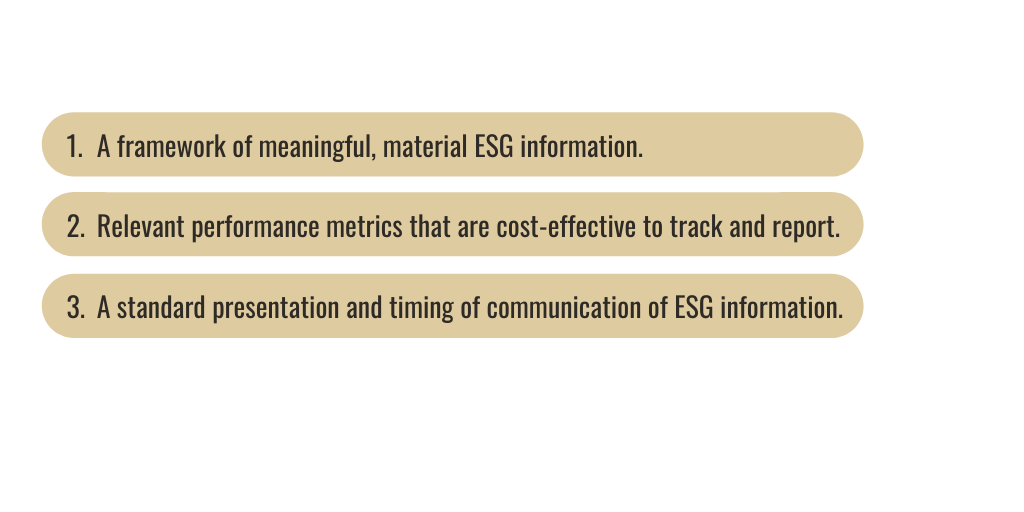The ESG Evolution In Oil & Gas: Clearing Up Misconceptions

Due to investor demands, conversations about ESG are increasing within the energy industry. While we have made progress in beginning to report on ESG initiatives, there’s work yet to be done. The market downturn presents an opportunity to focus on ESG initiatives as a way to demonstrate leadership and change investor perceptions of the industry.
What Is ESG?
ESG refers to Environmental, Social and Governance aspects of a company’s operations and performance. ESG does have a diversity and inclusion component, but diversity is really just a small part of the broad initiative.
An ESG framework provides a structure to address these issues holistically and consider the ways in which the issues impact each other. For example, strong governance should lead to positive environmental and social impacts. The key is that ESG provides a platform to demonstrate company performance and value creation in ways other than financial performance.
Why Is ESG Important?
ESG initiatives have a positive impact on performance and several studies have proven its direct link to financial performance. A quick Google search results in many academic studies that support this theory. Of particular interest to the energy industry, one Harvard Business School Working Paper provides evidence that “…companies significantly outperform their counterparts over the long-term, both in terms of stock market and accounting performance. The outperformance is stronger in sectors where the customers are individual consumers, companies compete on the basis of brands and reputation and in sectors where companies’ products significantly depend upon extracting large amounts of natural resources.”
“ESG PROVIDES A PLATFORM TO DEMONSTRATE COMPANY PERFORMANCE AND VALUE CREATION IN WAYS OTHER THAN FINANCIAL PERFORMANCE.”
Additionally, ESG has gone mainstream, with investors now demanding that companies have an ESG focus and employ varying degrees of ESG valuation metrics. Blackrock has made sustainability a priority, cutting investments in some coal producers and increasing the number of sustainability-focused funds that it offers.
Recently, Kimmeridge issued a white paper in which they challenged E&P companies to “…Make capital allocation decisions with an understanding of the environmental impact, including: the discontinuation of freshwater use for fracking, zero gas flaring and a commitment to carbon neutrality. Plan to achieve net zero emissions.”
In response to investors and industry trade groups, EOG, Continental Resources, Apache, EQT and WPX Energy, among others, all discussed their renewed focus on ESG performance and initiatives during their Q4 2019 earnings calls last week. Some companies, like Cimarex, have already begun to link executive pay to ESG measures, such as cutting emissions and flaring and responsible water use and disposal. Expect more to follow as boards continue to increase focus on ESG.
How Should The Industry Report On ESG?
Since it’s a relatively new and voluntary practice, there’s diversity in ESG reporting. Chief organizations currently promulgating reporting guidance include the Sustainability Accounting Standards Board (SASB), Global Reporting Initiative (GRI) and the Task Force on Climate-related Financial Disclosures (TCFD). Each of these organizations have a slightly different focus. Notably, the SASB is more focused on the investor stakeholder and has published industry-specific sustainability disclosure topics and accounting metrics for the oil and gas industry.
“DURING A TIME OF NEGATIVE INVESTOR SENTIMENT TOWARD THE ENERGY INDUSTRY, TAKING THE LEAD ON ESG ISSUES IS A WAY FOR COMPANIES TO DIFFERENTIATE THEMSELVES AND MAKE HEADWAY IN RESTORING INVESTOR CONFIDENCE.”
Additionally, the International Petroleum Industry Environmental Conservation Association (IPIECA), the International Association of Oil and Gas Producers (IOGP) and the American Petroleum Institute (API) jointly developed industry guidance for sustainability reporting. This guidance is linked to GRI guidance.
Currently, information is primarily communicated to investors in an annual report found on the company’s website. Numerous companies publish annual corporate responsibility reports based on the GRI framework (for examples, see Pioneer Natural Resources, Shell, Devon, EQT, Parsley Energy, to name a few). Apache also publishes an annual corporate responsibility report based on the GRI framework, but recently announced they’re aligning this report with SASB and TCFD standards.
Energy industry participants should agree on:

During a time of negative investor sentiment toward the energy industry, taking the lead on ESG issues is a way for companies to differentiate themselves and make headway in restoring investor confidence. It’ll be interesting to see how reporting on ESG continues to evolve throughout 2020 and beyond.
Related Insights
Looking for expertise in the energy industry? We’ve got you covered.
Find out why the new landmark legislation should provide a much-needed boost for the development of carbon capture.


